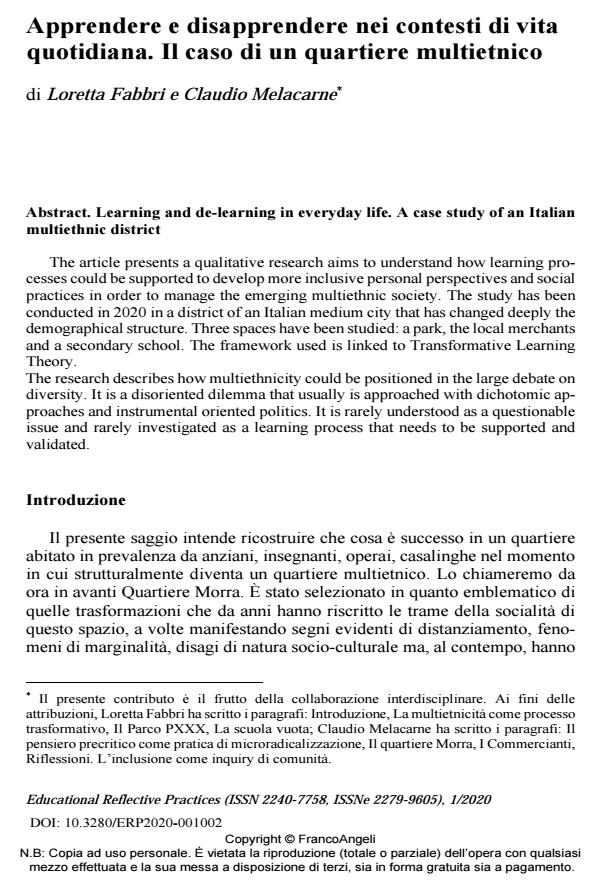Apprendere e disapprendere nei contesti di vita quotidiana. Il caso di un quartiere multietnico
Titolo Rivista EDUCATIONAL REFLECTIVE PRACTICES
Autori/Curatori Loretta Fabbri, Claudio Melacarne
Anno di pubblicazione 2020 Fascicolo 2020/1
Lingua Italiano Numero pagine 37 P. 18-54 Dimensione file 335 KB
DOI 10.3280/ERP2020-001002
Il DOI è il codice a barre della proprietà intellettuale: per saperne di più
clicca qui
Qui sotto puoi vedere in anteprima la prima pagina di questo articolo.
Se questo articolo ti interessa, lo puoi acquistare (e scaricare in formato pdf) seguendo le facili indicazioni per acquistare il download credit. Acquista Download Credits per scaricare questo Articolo in formato PDF

FrancoAngeli è membro della Publishers International Linking Association, Inc (PILA), associazione indipendente e non profit per facilitare (attraverso i servizi tecnologici implementati da CrossRef.org) l’accesso degli studiosi ai contenuti digitali nelle pubblicazioni professionali e scientifiche.
The article presents a qualitative research aims to understand how learning processes could be supported to develop more inclusive personal perspectives and social practices in order to manage the emerging multiethnic society. The study has been conducted in 2020 in a district of an Italian medium city that has changed deeply the demographical structure. Three spaces have been studied: a park, the local merchants and a secondary school. The framework used is linked to Trans-formative Learning Theory. The research describes how multiethnicity could be positioned in the large debate on diversity. It is a disoriented dilemma that usually is approached with dichotom-ic approaches and instrumental oriented politics. It is rarely understood as a ques-tionable issue and rarely investigated as a learning process that needs to be sup-ported and validated.
- Processi di radicalizzazione e prospettive trasformative Loretta Fabbri, Alessandra Romano, in EDUCATIONAL REFLECTIVE PRACTICES 1/2021 pp.8
DOI: 10.3280/erp1-special-2021oa12448 - Riflessioni pedagogiche sulla città come luogo di relazioni: da spazi di crisi a spazi di accoglienza Maria Grazia Proli, in EDUCATIONAL REFLECTIVE PRACTICES 2/2025 pp.96
DOI: 10.3280/erpoa2-2024oa18719 - From Disorientation to Transformation: Employing Cross-Cultural Dialogues for Understanding Learning in Contexts of Migration Taiwo Isaac Olatunji, Sara Bano, Jasmin Dazer, Martina Capaccioli, Ruoyi Qiu, in Journal of Transformative Education /2026 pp.56
DOI: 10.1177/15413446251346169 - Fostering interculturally responsive educators for a sustainable society Nicolina Bosco, Carlo Orefice, Loretta Fabbri, Mario Giampaolo, in EDUCATION SCIENCES AND SOCIETY 2/2022 pp.227
DOI: 10.3280/ess2-2022oa14768 - Traiettorie di apprendimento e pratiche di multi-culturalizzazione in un quartiere multietnico Martina Capaccioli, in EDUCATIONAL REFLECTIVE PRACTICES 1/2024 pp.274
DOI: 10.3280/erp1-2024oa18455 - Book Review: Understanding radicalization in everyday life FabbriL.MelacarneC. (2023). Understanding radicalization in everyday life. McGraw-Hill Education. 315 pp. ISBN: 978-88-386-5942-3. Nicolina Bosco, in Journal of Transformative Education /2025 pp.429
DOI: 10.1177/15413446251352385 - Dal terrorismo alla microradicalizzazione. Riflessioni per la ricerca pedagogica Claudio Melacarne, in EDUCATIONAL REFLECTIVE PRACTICES 1/2021 pp.68
DOI: 10.3280/erp1-special-2021oa12468 - Metodologie trasformative per promuovere apprendimenti emancipativi. Un'esperienza di ricerca-formazione con insegnanti Alessandra Romano, Nicolina Bosco, in EDUCATIONAL REFLECTIVE PRACTICES 1/2022 pp.115
DOI: 10.3280/erp1-2022oa13734 -
Beyond the Fascination of Critical Thinking
: The Contribution of Post-critical Pedagogy in Transformative Radicalization Studies
Claudio Melacarne, Loretta Fabbri, Alessandra Romano, in Journal of Transformative Education /2025 pp.388
DOI: 10.1177/15413446251352381 - La Student Measure of Culturally Responsive Teaching scale: adattamento e validazione per il contesto universitario italiano Nicolina Bosco, Loretta Fabbri, Mario Giampaolo, in EXCELLENCE AND INNOVATION IN LEARNING AND TEACHING 1/2022 pp.39
DOI: 10.3280/exioa1-2022oa13935 - La bottega degli apprendimenti. Tra multiculturalizzazione del lavoro, arene trasformative e ricerca educativa Martina Capaccioli, in EDUCATIONAL REFLECTIVE PRACTICES 2/2023 pp.132
DOI: 10.3280/erp2-2023oa15911
Loretta Fabbri, Claudio Melacarne, Apprendere e disapprendere nei contesti di vita quotidiana. Il caso di un quartiere multietnico in "EDUCATIONAL REFLECTIVE PRACTICES" 1/2020, pp 18-54, DOI: 10.3280/ERP2020-001002